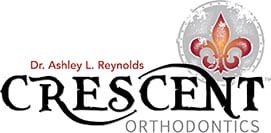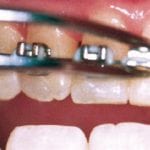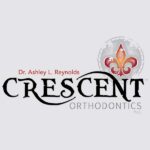At Crescent Orthodontics, our two most popular treatment options for achieving a straight smile are braces and Invisalign Clear Aligners. Dr. Reynolds can use either of these treatment methods to correct your misaligned teeth and to give you the smile of your dreams, but each method comes with its own set of pros and cons to consider. Our patients love the results they see with both of these treatment methods, so how do you determine which tool is right for you?
Dr. Reynolds and her team will consider the complexity of your case as well as your lifestyle and schedule needs when developing your treatment plan. This will help determine if one treatment method better suits your unique needs over the other. Here are some pros and cons to weigh as you embark on your orthodontic treatment journey.
Braces:
Braces have been the tried and true treatment method since they were invented in the 1800s. Although they have been around for centuries, the braces we use today at Crescent Orthodontics look drastically different than the first set created. In fact, the braces that you or our parents remember from their childhood are even drastically different from today’s braces.
As orthodontists continue to improve treatment methods and refine the braces technology, their comfort, aesthetic, and effectiveness increases. Below are three advantages and disadvantages of having braces as your orthodontic treatment method of choice:
Pros:
- Effective Treatment: Braces have a reputation for effectively treating more complex cases, a reason they continue to be a supported choice by orthodontists. They are highly effective for cases with severe misalignments, spacing and crowding issues, and bite irregularities. Braces provide Dr. Reynolds with control over precise tooth movement, so she can tackle orthodontic cases of any complexity.
- Predictable Results: Braces offer our patients a peace of mind because the results are reliable and predictable. Because braces are fixed onto the teeth, your teeth experience consistent and constant pressure, allowing them to gradually move into their predetermined position.
- Low Maintenance: After your braces are applied, there is minimal maintenance required on your end. Dr. Reynolds will make some adjustments to your braces throughout treatment, but your job is simply to maintain a good oral hygiene routine and to notify our office if you have any questions or concerns.
Cons:
- Aesthetic Concerns: At Crescent Orthodontics, many of our patients are concerned with the look of traditional braces. Even with their improvements over the years, modern braces are still more noticeable than clear aligners, and that can be a big concern for some of our patients. The brackets of conventional braces are visible when smiling, speaking, and even eating, which could be a deterrent for some patients.
- Dietary Restrictions: During your treatment with braces, it’s necessary to avoid foods that are hard, sticky, and chewy because they can damage your brackets and wires. Some common foods we suggest patients with braces avoid during their treatment are popcorn, gum, hard candies, and anything else that falls into one of the three categories above. Our office is happy to fix a broken bracket or wire, and knows that they’re going to happen no matter how careful you are, but the dietary restrictions during braces can discourage some patients.
- Discomfort and Irritation: Although it doesn’t last long, braces can cause some initial discomfort and irritation after they’re applied and after routine adjustments and tightening appointments. If you do experience any pain or discomfort, you can take an over-the-counter pain reliever, use orthodontic wax, or apply a cold compress to alleviate the pain.
Invisalign:
Invisalign aligners are virtually invisible, removable trays made of clear medical-grade plastic. These aligners are perfect for any patient looking for a more aesthetic and discreet treatment option. As long as you don’t have a complex case that requires the use of traditional braces, Invisalign is a great option for you. Below are some of the pros and cons patients note during their Invisalign treatment.
Pros:
- Aesthetic Appeal: The virtually invisible nature of Invisalign is one of their most loved features. Just as the name implies, these aligners are virtually invisible, allowing patients to discreetly improve their smile without changing their appearance in the process. One of the most significant advantages of Invisalign is its discreet appearance.
- Convenience: One of the biggest perks of Invisalign trays is their unbeatable convenience. The trays are removable, so you can take them out to enjoy your favorite foods, during a social event, or when you’re ready to brush and floss. Our patients also love the flexibility they have with Invisalign. Unlike traditional braces, Invisalign treatment doesn’t require as many in-office appointments, so Invisalign treatment is perfect for anyone with a busy schedule.
- Comfortable Fit: Unlike conventional braces that use brackets and wires, Invisalign Clear Aligners are made from comfortable, medical-grade plastic. You never have to worry about Invisliang poking your cheeks or causing sores like you do with traditional braces. Each set of aligners are custom-made to hug each tooth, minimizing any discomfort or bulkiness. Invisalign aligners are custom-made to fit snugly over the teeth, minimizing discomfort and irritation. The smooth plastic material is gentle on the mouth, reducing the likelihood of abrasions or sores commonly associated with metal braces.
Cons:
- Compliance is Key: Remember, these aligners are removable, but they can only move your teeth when you In order to stay on track in your treatment, it is imperative to wear your clear aligners for at least 22 hours a day. For Invisalign treatment to be effective, patients must wear the aligners for at least 22 hours a day as recommended by their orthodontist. Failure to comply with wearing instructions can prolong treatment time and compromise results.
- Limited Treatment Scope: Invisalign is a great treatment option for most orthodontic issues, but there are a few instances where braces are just necessary. Some patients with more severe misalignments and irregular bites require more extensive movement that only braces can provide.
- Lost Trays: Sometimes, Invisalign trays end up in the trash, which means you either have to dig in the trash to retrieve them, or you have to come into our office to get a replacement tray. Your clear aligners have to be taken out every time you eat or drink anything besides water, and on occasion you might not have your retainer close when this happens. We have heard patients tell stories of wrapping their retainers up in napkins and accidentally throwing them in the trash. Remember, when you have virtually invisible aligners, you have to be careful where you set them when they aren’t in your mouth.
At Crescent Orthodontics, we use both braces and Invisalign to give our patients their dream smiles. Both of these orthodontic treatment options are highly effective, which is why they are the two most popular treatment options to this day. If you are still struggling to decide which treatment option is right for you, schedule your complimentary consultation today and we will help you weigh the pros and cons to find the best treatment option for you!




